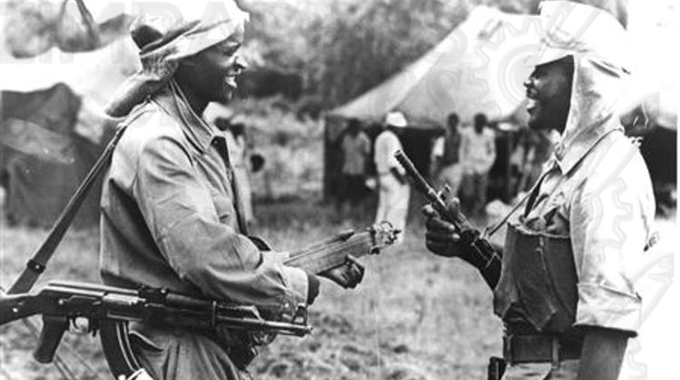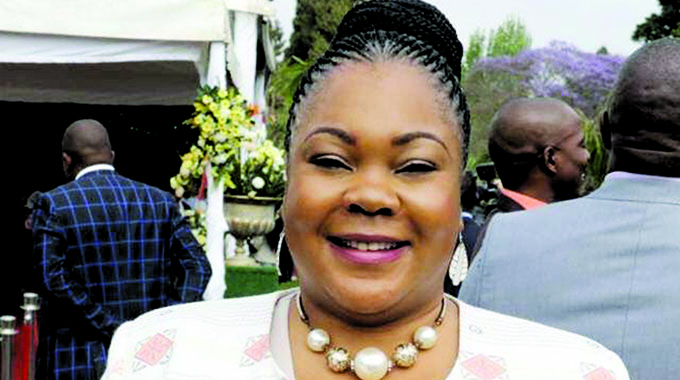Strange feelings of war time ‘adversaries’ . . . Lest we forget

John Gambanga Correspondent
Neither of them could hide his surprise. Both were rendered speechless by the unexpected meeting.
It was February 1980.
Only two metres separated them, but their lives during the last five years had been as dissimilar as that of wicked Lucifer and holy Gabriel.
Isaac, the elder brother, was clutching his Rhodesian FN rifle when he stepped out of the green tent that he shared with other black Rhodesian soldiers on duty at Dendera Assembly Point in Mutoko, about 170 kilometres northeast of Salisbury, the Rhodesian capital.
It was one of the 16 Assembly Points in which guerrillas of the two liberation movements, ZANLA and ZIPRA had been ordered to move into after the ceasefire that ended 14 years of fierce fighting between the Rhodesian army and the freedom fighters led by Robert Mugabe and Joshua Nkomo.
The ceasefire agreement was reached at Lancaster House in London in December 1979.
A number of Commonwealth countries had sent forces to supervise the historic elections.
Assembly Point Delta, also called Dendera, was monitored by Australian army officers, assisted by a small unit of mainly black Rhodesian soldiers.
Isaac, who was a captain, had been promoted to be second in command of the Rhodesian soldiers at the Assembly Point.
He had successfully completed a number of special training courses as a member of the Selous Scouts, the crack unit of the Rhodesian forces whose main task was to track down and kill guerrillas during the just ended war.
The Selous Scouts masqueraded as guerrillas and later turned against those civilians who would have given shelter and assistance to real guerrillas.
The young man who now stood stupefied in front of Isaac was Tarisayi, his younger brother who had left home five years ago and who was believed dead.
Tarisayi had spotted someone who resembled his brother Isaac and he had decided to visit the Rhodesian tent to find out. Isaac had just finished lunch and was about to go to attend to some urgent matters regarding his unit when he came face-to-face with Tarisayi.
The sight had shaken Isaac at first. He wanted to jump and embrace his sibling. He was momentarily delighted to see him alive after five long years.
Somehow, something about Tarisayi, an aura incommunicable restrained Isaac. His heart started to beat faster. He was gripped by myriad feelings. Feelings of love, of resentment, embarrassment and of guilt and mistrust gripped him.
This was his own blood, but he did not feel quite safe or comfortable before him. Isaac recalled those days a long time ago when the two of them spent time together herding cattle and goats back home in Nyanga.
It had been a very exciting time and both had revelled in their youth, he 15 and Tarisayi three years younger. They had played hide-and-eek in the mountains and other games with the rest of the village boys. Tarisayi had been great fun to be with.
When he had learnt that his young brother had crossed the border into Mozambique to join Zanla guerrillas Isaac had been worried, naturally. Reports later reached home saying that Tarisayi was among a group of guerrillas who had been killed in a contact with Rhodesian forces.
Resolving to avenge his brother’s death, Isaac had joined the Rhodesian army, intending to defect at a later stage and join the guerrillas. But the chance to defect never came and in fact Isaac soon forgot about Tarisayi.
He was selected, because he was big and agile, for the special training with the Selous Scouts who were joined by mercenaries from the United States, Britain, Portugal, Israel, South Africa and other countries who were paid to fight in defence of the white supremacy in the British colony of Rhodesia.
During the last two years, Isaac and colleagues had killed many innocent civilians whom they had accused of supporting the guerrillas’ activities. They had also tortured captured guerrillas mercilessly in their quest to extract information about the guerrilla’s activities in the rural areas.
In his last contact with guerrillas, Isaac had been given a special medal by the Rhodesian army for killing two guerrillas.
He was a Rhodesian war hero.
He looked intently at Tarisayi and wondered what could have happened if the two of them had met in a military contact during the war. His brother looked a changed man. He was bigger and stronger than the small Tarisayi with whom he had played with five years ago.
Time had transformed him from the friendly and timid urchin to a fierce looking young fighter — a guerrilla, whom the Rhodesians called terrorist.
His short black hair was dishevelled and he could have done with a shave. The eyes were very still and expressionless. No, what was it that Isaac could see in them? Anger, resentment, umbrage, acrimony, ill will? He could not say exactly, but he knew instinctively that it wasn’t something very good.
The eyes held Isaac’s gaze for what seemed a long time, yet it was hardly three minutes. The younger brother wore a pair of jungle shoes, faded blue jeans and a khaki shirt that badly needed a wash.
Slung across his left shoulder was the unmistakable Russian AK47 assault rifle. This was the weapon that most guerrillas used as it was very effective.
If the elder brother had tears to shed, his war-hardened heart managed to restrain them. Tarisayi, on the other hand gave away no apparent feelings. Not that he did not have any. He just looked smug.
At first, he was disgusted at the sight of his elder brother in enemy uniform with an enemy weapon, the FN rifle.
If it were some other time, he would have flown into a rage and opened fire without hesitation. That is what he had been trained to do. “Urayamhandu!” he would have shouted in his heart. That war cry meant, Kill the enemy!
Things had changed, so had his feelings. Mild animosity took over anger, but the animosity was coated with joy. A different kind of joy. It was a very strange feeling.
In that short three minutes, Tarisayi’s heart was stormed by a medley of emotions that he had never before experienced. He wanted to leap and shout and hug his brother with excitement.
Part of him wanted to cry, yet the other part said smile. He disobeyed both. The sight of Isaac had transfixed him into a living statue, made of flesh, with a mind and feelings.
Yes, Tarisayi was emotionally disturbed as never before in his short life. His homecoming was like a bad dream. A nightmare. His brother had supported a system that had forced Tarisayi and thousands of others at the Assembly Point to leave home without bidding farewell to anyone and seek refuge in a foreign country in order to liberate their motherland from white oppressive rule.
His mind raced back to that fateful Sunday night when he had sneaked from home with his two friends, Kudakwashe and Fibion, both of whom had since died in the war. His five years in the bush had planted in him a heavy load of hatred towards the Rhodesian system.
The sight of a soldier, a black one for that matter, wielding a gun in support of that system irritated him. It was worse than the pungent smell of the ammonia he used in the chemistry laboratory at high school in Nyanga.
It generated so much hatred in him that he would have instinctively gone for his gun in a wanton rage of destruction.
In Mozambique, Tarisayi had enlisted with Zanla forces and had been trained to kill the enemy. He had been trained in mass mobilisation, small arms training, guerrilla warfare, military intelligence and other courses.
He had been deployed into the war front and carried out memorable assaults on enemy targets inside Rhodesia. At no time during those years had he harboured any feeling of compromise for the enemy forces. Once an enemy, his instructor had said, always an enemy. If you do not get him first, you are a dead man.
Although the war had hardened his heart, Tarisayi now felt a strong bond of commonality and brotherhood with Isaac, who stood in front of him. It was an uneasy feeling.
Not one given to crying, Tarisayi managed to control his inner feelings. His mind was filled with a myriad of thoughts.
Words he could not utter to his brother came to his mind. His life in the training camps in Mozambique. The enemy attacks and bombings that he had miraculously survived at Nyadzonia and Chimoio.
The events came back like a replay of an old Alfred Hitchcock horror film.
Tarisayi could not find the words to express himself. The indignation that boiled in his heart made it difficult at first for him to reconcile with his brother.
Isaac was his own brother and to speak of those days would be like opening up old wounds. It would not sooth his troubled mind and heart. It was for people like Isaac, who was unemployed when Tarisayi left home that the war had been fought.
Tarisayi swallowed the painful pill reluctantly. Painful because it was too rough to be gulped down his smooth throat without causing sores, but then he knew that brothers would always remain brothers.
Presently, he let his AK47 rifle drop onto the ground beside him. He took the first step forward. Isaac still dumbfounded, saw the gesture of brotherhood and followed suit. His FN rifle fell to the ground and both men embraced in silence.
The arms were comforting enough. There was a long, but very loud silence. The two brothers exchanged strange feelings, thoughts and memories silently.
The strange feelings melted like ice drops in the sun. They slowly slid down each other’s body. Refreshingly healing the wounds. When at last they let go of each other, the brothers smiled. Both faces lit up. Tears rolled on both sets of cheeks. But these were not tears of sorrow. They were joyful tears. For another minute or so, they shook each other’s hands.
“Mukoma Aik!” even Tarisayi’s voice was still gripped by a strange feeling. It was not natural.
“Tari!” replied Isaac.
Still smiling, Tarisayi picked up his gun and made a mental note to tell his brother that his new name, his nom de guerre was Pondayi Mabhunu (kill the Boers).
He had adopted it during the first week in Mozambique and he wanted to keep it forever as it had survived the war. It was a lucky name for him.
The young brother realised that there was a lot of re-education to be done and he resolved to begin with his own brother Isaac.
(Extracted from “The Yellow Teacup” (2020) by John Gambanga). Gambanga is novelist and veteran journalist and is former editor of The Manica Post.







Comments